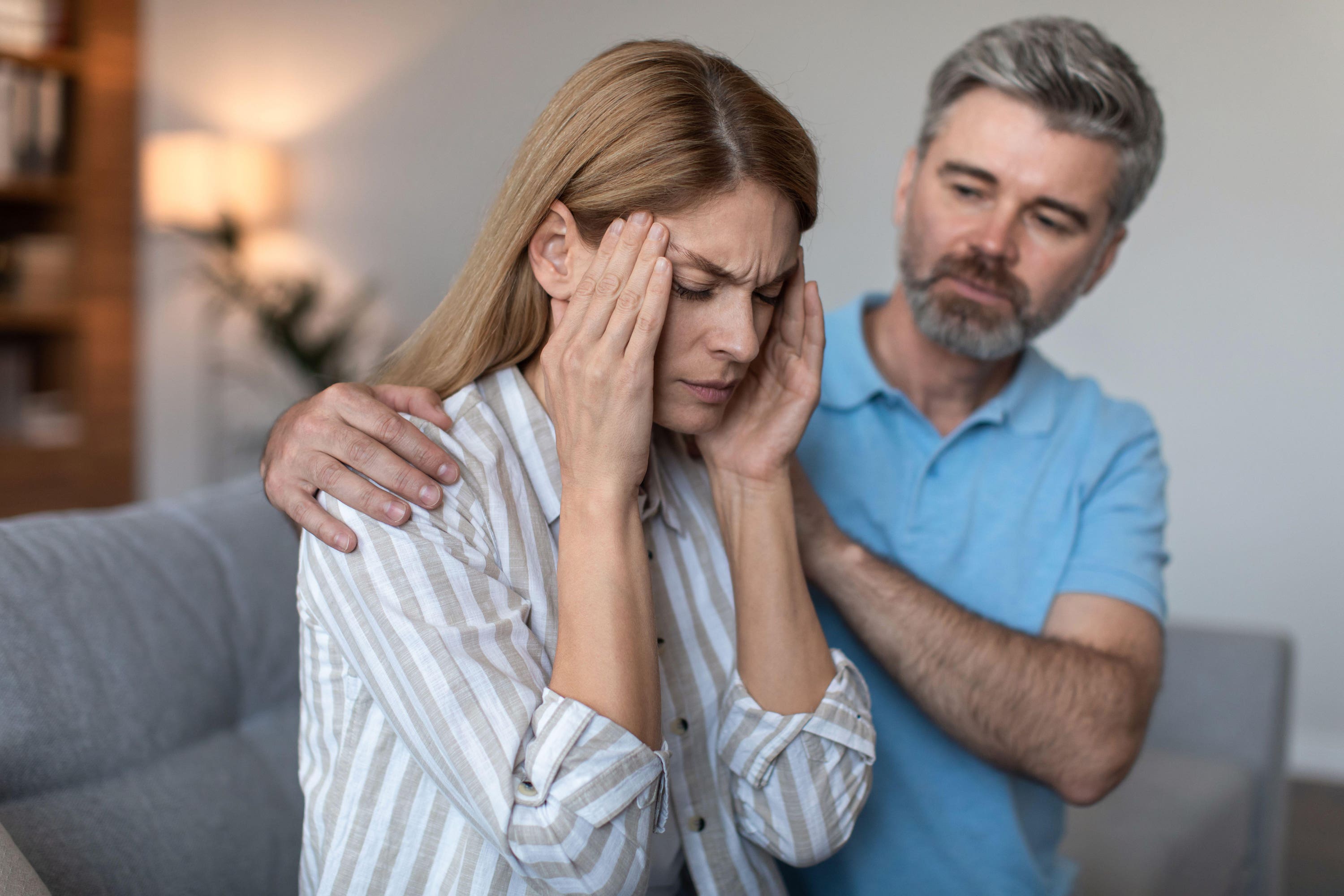How to support your partner through the menopause, as research shows symptoms can cause divorce
A study reveals that many women believe menopause was a factor in their relationship breakdown. By Katie Wright.

Your support helps us to tell the story
From reproductive rights to climate change to Big Tech, The Independent is on the ground when the story is developing. Whether it's investigating the financials of Elon Musk's pro-Trump PAC or producing our latest documentary, 'The A Word', which shines a light on the American women fighting for reproductive rights, we know how important it is to parse out the facts from the messaging.
At such a critical moment in US history, we need reporters on the ground. Your donation allows us to keep sending journalists to speak to both sides of the story.
The Independent is trusted by Americans across the entire political spectrum. And unlike many other quality news outlets, we choose not to lock Americans out of our reporting and analysis with paywalls. We believe quality journalism should be available to everyone, paid for by those who can afford it.
Your support makes all the difference.As well as causing physical and emotional symptoms, the menopause can have a dramatic impact on relationships, according to a new survey of 1,000 women.
Seven out of 10 women blamed the menopause for their divorce or marital problems, with some saying it increased arguments or domestic abuse.
Only a third of respondents polled by the Family Law Menopause Project and Newson Health said they had been offered treatment, with many believing it could have potentially saved their marriage.
“Menopause can be such a challenging time for two people in a relationship,” says psychotherapist Cathy Press, author of When Love Bites: A Young Person’s Guide to Escaping Harmful, Toxic and Hurtful Relationships, who lists mood swings, physical changes, disrupted sleep and night sweats as just some of the potential effects of menopause, which usually happens between the ages of 45 and 55, and perimenopause can start up to a decade before.
“All of these symptoms can leave a person with little energy, enthusiasm and hope, and some experience a sense of grief at the loss of the person they were pre-menopause.”
The effect on couples who are experiencing ongoing difficulties can be even worse, she continues: “The onset of menopause can be a catalyst for many women to recognise there is something wrong in the relationship.”
Every woman experiences the menopause differently, but having a supportive partner can make a huge difference, and could prevent relationship problems.
Here, experts explain some of the ways you can help if your partner is going through the menopause…
Learn about the menopause
“Education is the key, and normalising the conversation helps not just partners, but all of us,” says psychologist and author Dr Audrey Tang (draudreyt.com).
The first step is to read up on the symptoms, but remember that they vary greatly: “Some women may experience symptoms similar to PMS, others often report a ‘flat’ mood which can all too easily be dismissed as stress or overwork.”
If your partner is struggling, encourage them to seek help from a doctor or online resources.
“Menopausesupport.uk is an excellent website for resources and information, including a symptom checker and a factsheet for partners,” Tang continues.
“GPs are not all trained to deal with menopause and it may be that you need to ask and ask again to speak to someone who might be able to diagnose your symptoms as menopause.”Be understanding
While educating yourself is a good idea, be mindful that not every emotional moment or argument is necessarily due to hormonal changes.
“Don’t attribute all problems to the menopause, mock the symptoms or use menopause as a get out of jail free card,” says BACP accredited therapist Cate Campbell.
“What helps the most when it comes to relationships is open communication,” says Tang. “Ask questions such as, ‘What do you need me to do?'”
Listen to your partner and show them that you understand they’re going through a difficult time, whether that’s through words or actions.
“It may be a cuddle or reassuring them that everything will be OK and, most importantly, that they are loved,” says Press. “Affection and remaining physically close, loving and attentive will support your partner to feel desired and accepted by you.”
Work together as a team
“For both partners, it’s important to see this time as an opportunity, rather than a problem,” says Campbell.
“Seeing menopause as affecting them both, albeit in different ways, can help couples to navigate through this time, working out what they can do together.”
While it’s important to let your partner decide what’s best for them, there’s no harm in looking into treatment options, she adds: “There are pharmaceutical, homeopathic and natural remedies for many menopause issues, and partners can help by being supportive and interested in the process of finding out about these.”
Don’t take it personally
If you’re feeling more distance between you and your partner than usual, that’s normal.
“Many women find menopause symptoms both uncomfortable and embarrassing, and become irritated if their partner mentions them,” says Press. “Intimacy may be difficult when even a brief hug can bring on a hot flush, and libido may diminish.”
Campbell says: “Some women find themselves reappraising their life, relationship and choices, and may take up new jobs or activities that their partner finds threatening or excluded from.”
Instead of demanding to know why your partner is acting differently, accept the changes and let them know you’re there for them whenever they want to talk.
“Remember it’s not something you can fix and make better, so work on being patient and helpful where you can,” says Press. “Partners can be supportive by remembering that symptoms like mood swings can be a direct impact of the loss of hormones, and that their partner is still the same person, but experiencing themselves differently.”